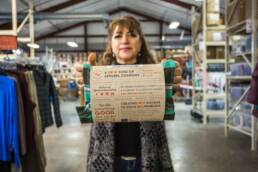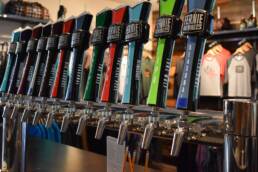An Oregon startup called the Renewal Workshop is seeking to cultivate the next sustainability movement one blown-out zipper at a time. Story by Geoff Nudelman.
Tucked away in the Columbia River Gorge of Oregon, Cascade Locks is a quintessential, quiet American town. One main street anchors a community of less than 1,200. It’s more stopover than stayover for travelers passing on Interstate 84. It’s just about the last place you’d expect to see the next wave of global sustainability taking shape. In a way, that’s how Nicole Bassett and Jeff Denby like it.
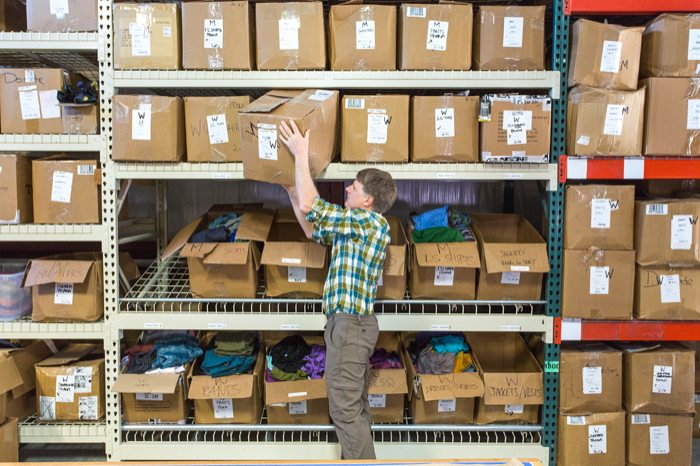
The two fashion industry veterans left high-profile and founding positions at PrAna and Pact Apparel, where they both oversaw Fair Trade practices, to tackle one of the industry’s dirty little secrets: slightly damaged goods heading to the landfill.
According to the Environmental Protection Agency (EPA), 11.5 billion kilograms (25.3 billion pounds) of textiles end up in the landfill every year. That mind-boggling figure led Bassett and Denby to the drawing board. The goal: figure out a way to give new life to a shirt, a pair of pants or other soft garments that had fixable defects. They call their initiative The Renewal Workshop. “We wanted to use the best available technologies to solve this and not cut any corners,” Bassett says.
From December 2014 through March 2015, they hit the fundraising trail wooing multiple angel investors. After their first round was complete, the next challenge was settling on a home base. They went to Oregon and began searching the Portland metro area, but found the Gorge was more eager to have them.
“The City (of Cascade Locks) really came to bat. The Port Authority was a great partner, and they gave us an incredible deal on the warehouse space,” Denby says.
Down a quiet, two-lane road, past churches, a school and a strip of grass lovingly known as the “Cascade Locks Airport,” they set up shop in most of a 929–square metres (1016–square yards) facility essentially customized for their needs—the biggest being the space for the Tersus Solution cleaner.
This massive tumbler is the heart of the Workshop’s operation. In order to sterilize all of the garments that come through their doors, they run 22.6–kilogram (49.8–pound) batches through the machine, which resembles something like a vault. It is waterless, dryer-less and is one of only six in the world.
The cleaning process turns the garments into like-new quality, even replacing the Durable Water Resistant (DWR) coating that some of these damaged goods arrive without. Once the garments have finished their cycle, they are turned over to the Workshop’s three-person, repair department. Bassett and Denby hired Luz Rule to oversee Quality Control. She’s a 25-year maven of quality and repair who met Bassett while working at Patagonia, a company that has so far led the industry in sustainable practices. “It was an easy decision to join them,” Rule says. “I really believed in the startup culture and the overall mission of the project.”
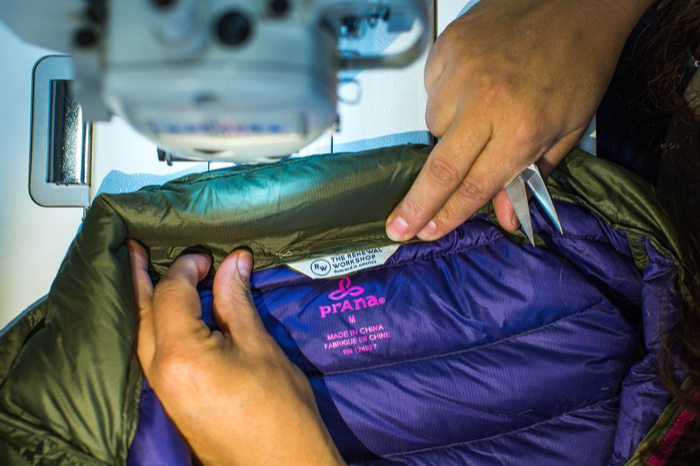
Initially, five brands—Indigenous, Toad and Co., Ibex, Mountain Khakis and PrAna— are “partners” in the program, sending damaged orders of up to 1,000 units to the warehouse for renewal. After repairs, the “new” garments are co-branded with the home company’s label and a new tag from the Workshop. All of the repair work is certified and acts just like the original manufacturing—sometimes better.
“We take a lot of this stuff out to test in the wild,” Bassett says, noting the Workshop’s proximity to great hiking, mountain biking and camping. Cascade Locks also endures 195 centimetres (77 inches) of rain each year.
The Renewal Workshop prides itself on being one of the first closed-loop processes of its kind, meaning from drop-off to sale, nothing goes to landfill. Any potential waste is upcycled or recycled, and they keep income and jobs in the community.
As pieces are finished, they are barcoded, photographed and placed for sale on the Workshop’s own online marketplace. In their model, the Workshop can sell these items at a fraction of their original retail. They will retain a majority of the profits, but do send an undisclosed percentage back to the donating partner.
The process is progressive for an industry that creates more waste and excess than just about any other. The Renewal Workshop prides itself on being one of the first closed-loop processes of its kind, meaning from drop-off to sale, nothing goes to landfill. Any potential waste is upcycled or recycled, while keeping income and jobs local.
Bassett and Denby are simply beaming about their prospects. The Workshop is moving towards repurposing 1% of product normally headed to the landfill. They’re already gaining knowledge of how some of the liners and fabrics break down. They plan on turning that into usable knowledge for a future service to new brand partners, of which Bassett and Denby expect to add four or five this year.
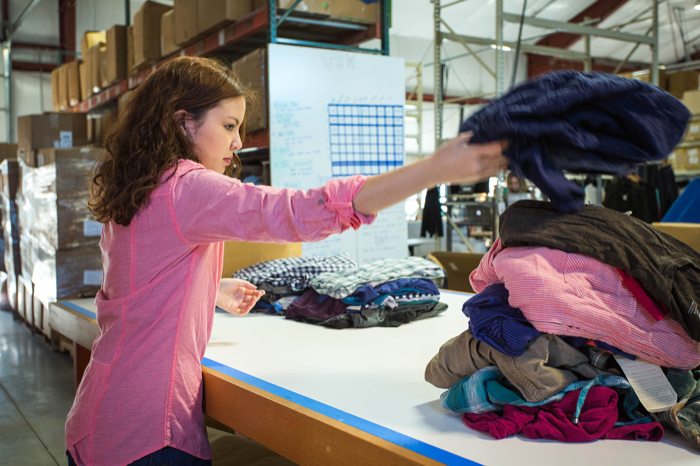
Related Stories
Event: Gathering the Thread of Social Change
Get ready for a great show on Wednesday, Nelson residents. For more info, hit up www.DeconstructingDinner.com
Fernie Brewing Company Hosts Trail to Ale Challenge
Fernie Brewing Company is celebrating a new tasting room as well as a kick-ass Trail to Ale Challenge. It's been a big…
Quebec Company Unveils World’s First Electric Snowmobile
Taiga Motors, a start-up based in Montreal, Quebec, has revealed what it's calling the world's first electric…
Icicle Brewing Company is proud to present the second annual Leisure Games
Icicle Brewing Company has been turning out consistently quality craft beer. On top of that, they have hosted a…
Rossland’s Leah Evans Skis Towards Change
Leah Evans: Skiing Her Way to Change by Clare Peacock, photo by Jessica Robinson Only two months into our calendar…
Utah Company Powdr Buys Silverstar Mountain Resort
American company Powdr has entered the Canadian ski market with the acquisition of Silverstar Mountain Resort near…


